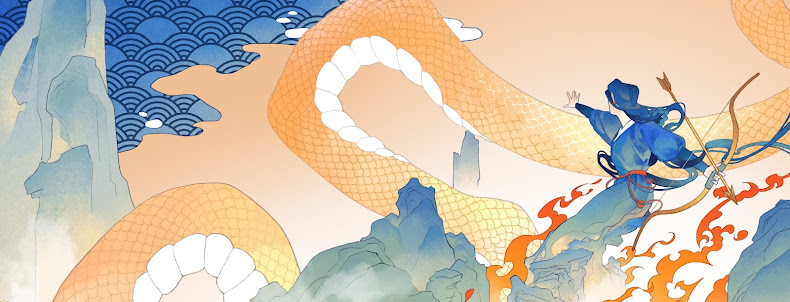For
readers who have read The Green Phoenix,
they will have noticed that I had incorporated in it two famous Chinese lyric
poems (“ci” 詞, i.e.
lyrics that are set to tunes): “Nian Nu Jiao - Reminiscing Red Cliffs” 念奴嬌之赤壁懷古 by
Song dynasty poet Su Shi 蘇軾 (1037 – 1101)
and “The Immortals by the River” 臨江仙 by Ming poet
Yang Shen 楊慎
(1488 – 1559). I would just like to say a few words as to why I had chosen them.
In the opening chapters, the first poem
appears in a scene where the young Bumbutai performs a recital of it to entertain
her two Jurchen (Manchu) royal guests in her Mongolian home estate. This poem is about the poet's nostalgic memory of the ancient hero Zhou Yu from the Three Kingdoms era, and it
was chosen to reflect Bumbutai’s love of Chinese culture and history, and, in a
premonitory way, her sense of humility in face of history as the big picture and her belief
that chance or fate works on the individual and collective levels to make history
happen.
Near the end of Part Two, the second poem
is presented during a second meeting between the young Shunzhi Emperor and the
beautiful but already married Lady Bombogor, who is to become his favorite
Consort Donggo. By brushing the poem on a painting that Shunzhi just finished
working on, she shows her intelligent understanding of his thwarted dream to live
a commoner’s simple and peaceful life. The poem laments the futility and
emptiness of worldly pursuits and the transience of life itself, with an
implied Buddhist mantra of letting go (放下). It mirrors Shunzhi’s escapist mentality and presages his later
decision to become a monk.
念奴嬌之赤壁懷古 -蘇軾
大江東去,浪淘盡,千古風流人物。
故壘西邊,人道是,三國周郎赤壁。
亂石崩雲,驚濤拍岸,捲起千堆雪。
江山如畫,一時多少豪傑。
故壘西邊,人道是,三國周郎赤壁。
亂石崩雲,驚濤拍岸,捲起千堆雪。
江山如畫,一時多少豪傑。
遙想公瑾當年,小喬初嫁了,雄姿英發。
羽扇綸巾,談笑間,强虜灰飛煙滅。
故國神遊,多情應笑我,早生華髮。
人生如夢,一樽還酹江月。
羽扇綸巾,談笑間,强虜灰飛煙滅。
故國神遊,多情應笑我,早生華髮。
人生如夢,一樽還酹江月。
My Translation: Nian Nu Jiao - Reminiscing Red Cliffs, by
Su Shi:
The Great Yangtze scurries forever east, many
an ancient hero buried in its sweep.
West of the old forts, they say, was
fought Zhou Yu’s Battle of Red Cliffs.
Rampant cliffs that pierced clouds, angry
waves that ripped shores, churning up snowy foam;
Such a picturesque country, so full of
gallant men in times of old.
Thinking of Zhou Yu in that distant past,
he must’ve looked valiant with Xiaoqiao his new bride.
Feather fan in hand, hair tied in silk,
his enemies crushed to dust as he joked.
Such was my dreamy tour; mock me as
maudlin, but I’m just a young white-haired bloke.
Life is but a dream; let me offer wine to
the river moon.
臨江仙 -楊慎
滾滾長江東逝水,
浪花淘盡英雄。
是非成敗轉頭空。
青山依舊在,幾度夕陽紅。
白髮漁樵江渚上,
慣看秋月春風。
一壺濁酒喜相逢。
古今多少事,都付笑談中。
浪花淘盡英雄。
是非成敗轉頭空。
青山依舊在,幾度夕陽紅。
白髮漁樵江渚上,
慣看秋月春風。
一壺濁酒喜相逢。
古今多少事,都付笑談中。
My Translation: The Immortals by the River, by Yang Shen
On and on to the east rolls the Great
Yangtze,
Burying in its current hordes of gallant
men.
Right or wrong, shame or glory, all comes
to naught.
Only the green hills linger, after many a
glowing sunset.
White-haired men by the river, mind the
seasons not;
All they care is in the bottle, and
meeting with old friends.
Stories new and old, come alive in their
witty retort.
